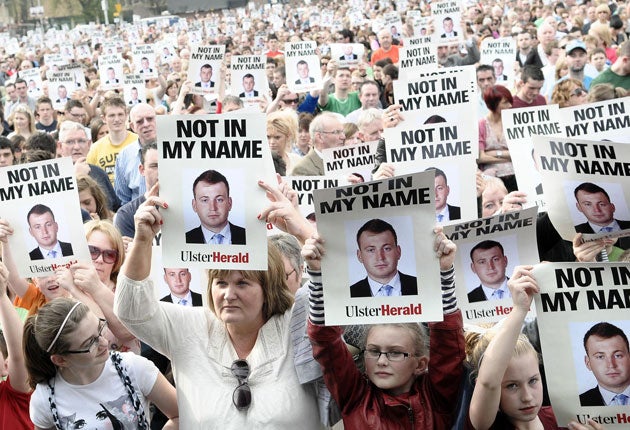More people go armed as Ulster dissident threat grows
Violent paramilitary opposition to the Northern Ireland peace agreement is at its fiercest for 10 years, <i>IoS</i> investigation reveals

More than 1,100 people on paramilitary death lists in Northern Ireland are being allowed to carry guns for their own protection, as experts warn the danger from dissidents is at its highest in a decade.
An Independent on Sunday investigation has identified violent and growing opposition to the peace agreement. Bombing incidents are at their highest level in eight years. There were 100 incidents in 2010/11.
Some 205 new personal protection weapon (PPW) licences – for people whose lives are under threat – were granted by the Police Service of Northern Ireland (PSNI) last year, a five-fold increase on the 42 issued in 2008. Almost a thousand (948) existing licences were re-approved – up from 375 in 2008.
An estimated 500 "threat notices", known as PM1 forms, were issued last year by police to individuals under threat from terrorists, according to a police source. And paramilitary attacks are going virtually unsolved – of 272 paramilitary attacks between 2008 and 2010 – just 12 have been solved according to the PSNI.
The number of people claiming to be homeless through intimidation was up by a third (33 per cent) in 2009/10 – with 774 people going to the Northern Ireland Housing Executive for help that year. Paramilitary and sectarian intimidation was cited in 85 per cent (652) of the cases.
And sectarian incidents rose from 1,595 in 2008/09 to 1,840 in 2009/10 – a 15 per cent increase. Sectarian crimes in the same period went up from 1,017 to 1,264 – a 24 per cent increase – according to the latest Good Relations Indicators from the Office of the First Minister and Deputy First Minister.
The surge in dissident activity over recent months includes the murder of Ronan Kerr, the first police officer to be killed in Northern Ireland for two years, and the use of a coded warning in London – the first in more than a decade – which sparked a major bomb alert last month.
Terry Spence, chairman of the Police Federation of Northern Ireland, said: "We are extremely concerned at the growing level of violence, over 200 bomb and gun attacks on police, Army and civilian targets over the past 18 months... We are back to looking under our cars again." He accused the Government of having an "over-eager desire to portray Northern Ireland as a normal trouble-free society, when there is evidence of a growing terrorist threat which points to the contrary."
The decline in Northern Ireland's economy has left a generation of disaffected youth vulnerable to propaganda from republican extremists posing as mentors. Michael Gallagher, a co-founder of the Omagh victims group, said: "Politicians will always say 'it's nothing like what we had in the '70s and '80s'. Well, that's a good line to throw out, but I'm old enough to remember the Provisional IRA being formed in 1971 and people saying, 'They're just a bunch of young people that have nothing else to do and it will not last'."
In response to the growing threat, the Northern Ireland Office has allocated an extra £200m to fighting dissidents over the next four years. The PSNI has spent more than £69m since April 2009 in overtime to combat the dissident threat.
Dr John Bew, of the International Centre for the Study of Radicalisation, at King's College London, warned that dissidents are an increasing problem and should not be underestimated: "They are stronger; they have got momentum. That makes them more dangerous than they were a decade ago."
Bookmark popover
Removed from bookmarks